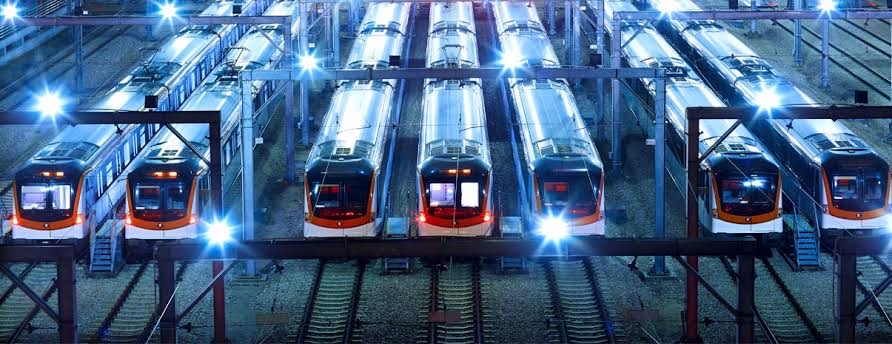RAIL
Nigeria lags as German switches air travelers to rail

…Targets 4.3 million commuters
While Nigeria keeps making moves to improve movement of passengers and cargoes by rail, even in when confronted with the stark reality of no rail tracks connectivity to country’s major and strategic airports, latest reports says that, the German Federal Association of the German Aviation Industry (BDL) and German Rail (DB) have launched a joint action plan to strengthen transport integration between air and rail, which will encourage more people to use rail, helping to reduce overall greenhouse gas emissions in the transport sector.
BDL and DB see the potential for around 20% of those travelling by plane within Germany around 4.3 million people per year before the pandemic to choose rail instead. This will be achieved by offering reliable services, attractive offers and ongoing infrastructure expansion.
Germany’s aviation sector carried around 23 million passengers in 2019, with 8 million connecting with long-haul flights and 15 million making domestic trips. Both BDL and DB believe that around a sixth of CO₂ from domestic aviation could be avoided by reducing domestic air traffic
The agreement acknowledges that rail CO₂ emissions are significantly lower than from aviation and that improved integration of the two transport modes will result in a substantial reduction in the greenhouse gases caused by transport. The aviation industry forecasts a 1.5% annual increase in fuel efficiency between now and 2021, partly achieved by the retirement of older aircraft during the pandemic.
Interestingly, DB, which advertises its ICE services as operating 100% from green electricity, admits that it will take until 2030 before 80% of traction electricity meets this standard. It will not reach 100% until 2038. Some high-speed lines continue to be directly fed with power from coal-fired power stations at 15kV ac, 16.66Hz frequency, which is required for traction current in Germany.
Among the specific actions are the previously announced expansion of the Lufthansa Express Rail service to include more domestic German routes with the addition of several new fast Sprinter connections. The aviation industry intends to reduce short-haul flights such as Cologne – Frankfurt and Berlin – Nuremberg, most of which connect with long-haul flights at hub airports such as Frankfurt. ICE services will step in to fill this void.
Implementation of parts of the planned Deutschland Takt regular interval timetable will also speed up journeys to airports over the next few years, with significant reductions envisaged in the late 2020s/early 2030s as new infrastructure becomes available. Short to medium term this includes: in 2021, additional ICE trains on the Berlin-Munich, Berlin-Frankfurt/Main-Hamburg-Ruhr. In 2022, the start of new fast ICE sprinters between Munich, Nuremberg and the Ruhr as well as between the Ruhr and Berlin. A new Frankfurt/Main-Siegen-Dortmund/Münster inter-city route will also commence
By 2023, the new Wendlingen-Ulm high speed line opens, reducing Stuttgart-Munich journey times from 2024, the introduction of a half hourly frequency between Hannover and Berlin plus additional high-speed services between the Ruhr and Berlin, and from 2026, half-hourly service on the Hamburg-Hannover-Frankfurt/Main-Stuttgart-Munich route and the commissioning of the new Stuttgart main station (in December 2025).
Industry analysts say, improving service quality is seen as important for rail to replace feeder flights and avoid car journeys to airports. Simplified baggage handling arrangements to ease the transfer from train to plane for long haul travelers are planned with pilots set to take place at Frankfurt Airport where the ICE station is more than 500m from the check-in area.
Five German airports are already linked to long-distance and local rail services: Berlin, Düsseldorf, Frankfurt, Cologne/Bonn and Leipzig/Halle; and a further seven airports just to local services: Dresden, Friedrichshafen, Hamburg, Hannover, Lübeck, Munich and Stuttgart. Stuttgart Airport will be connected to long-distance trains from December 2025. The Bavarian state government is evaluating options for better connections to Munich airport, which is the second largest international hub after Frankfurt.
Tochukwu Nwosu
-

 AVIATION5 years ago
AVIATION5 years agoPhoto News: Air Peace commence flight operations to South Africa
-

 Car News5 years ago
Car News5 years agoPolestar is recalls over 2000 electric cars due to software bug
-

 Technology5 years ago
Technology5 years agoCommon mistakes in CO₂ emissions calculations
-

 RAIL4 years ago
RAIL4 years ago36 Killed in Pakistan Train Accident
-

 Business5 years ago
Business5 years ago2016 Volvo XC60 review and specifications
-

 Reviews5 years ago
Reviews5 years ago2021 Audi A6 Specifications and Review
-

 SAFETY / CAR CARE5 years ago
SAFETY / CAR CARE5 years agoHandbrake warning light; what it means and what to do
-

 NEWS4 years ago
NEWS4 years agoFG To Spend ₦900 Billion On Fuel Subsidy In 2022
